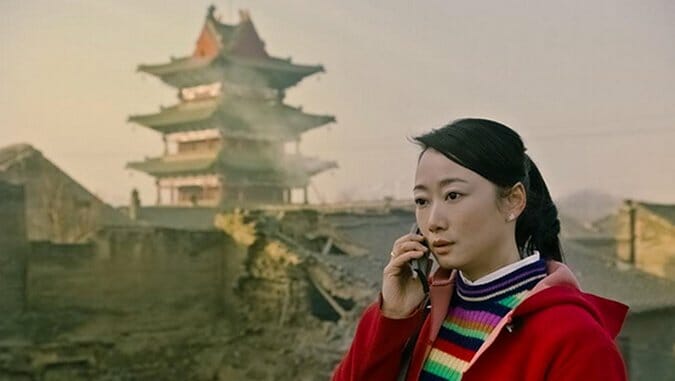
The films of Jia Zhangke often explore a simple, supple theme: the ways time changes everything. A frequent chronicler of the massive transformation going on in China—technological, cultural, economic—Jia studies how individuals cope when the world they know shifts under their feet.
The filmmaker behind The World, Still Life and A Touch of Sin plays with that theme anew for Mountains May Depart, a somewhat straightforward love story. I say “somewhat” because the film, which travels across three time periods, could almost be viewed as Jia’s one-movie version of Richard Linklater’s Before trilogy, watching the development of a couple’s relationship over 25 years or so. But Mountains May Depart soon proves that with whom it’s concerned is more than just a handful of characters—yet again, the writer-director is investigating an entire society in transition.
Opening in 1999 to the strains of the Pet Shop Boys’ exuberant cover of The Village People’s “Go West,” Mountains May Depart introduces us to a romantic triangle already in progress. Tao (Zhao Tao) has feelings for both Liangzi (Liang Jin Dong), a worker in a coal mine, and Zhang (Zhang Yi), a wealthy man who will end up buying Liangzi’s mine. Liangzi resents Zhang, a feeling that’s only exacerbated when Tao accepts Zhang’s marriage proposal, declining to attend the wedding.
That triangle’s destiny will play out over two more eras—2014 and, provocatively, 2025—but that summation doesn’t do justice to Jia’s particular ambition. While he certainly cares about his characters’ fate, he also has his eyes fixed on larger issues. In this sense, Tao, Liangzi and Zhang represent different aspects of Chinese culture, their individual paths meant to be heavily symbolic.
For example, it’s probably no surprise that Liangzi is the first to suffer a crippling hardship: His working-class job brings about a deadly respiratory illness in 2014, and surely Jia is suggesting that such manual-labor positions are on their way out in modern life. By contrast, Zhang only gets richer, eventually moving to Australia, although his wealth and privilege will cause him to be disconnected from his roots. Some of Mountains May Depart’s signifiers may be uniquely Chinese, but Jia’s concerns about progress and the loss of unique cultures in the rush toward globalization—which have been frequent touchstones in his films—are easily translated into any language.
There is something freeing about Jia’s refusal to be tidy in his exploration of these three characters over time. In 2014, the story focuses on Tao and Liangzi, while in 2025, Zhang is the most prominent of the trio, but even then he’s more of a peripheral character. (The filmmaker’s vision of the future turns its attention to Zhang’s grown son Dollar, played by Dong Zijian, and an unexpected romance that comes into the young man’s life.) Other filmmakers would go for easy dramatic ironies—say, Dollar falling for Liangzi’s adult daughter, the two never knowing the unrequited love of a generation ago—but Jia is almost clinically pragmatic when approaching his protagonists. Consequently, Mountains May Depart stays beguilingly unpredictable, Jia’s unromantic worldview perhaps representative of a society in which our individual lives are powerless against the endless march of technology, materialism and, of course, time.
However, Mountains May Depart also reflects the downside to such a symbolic storytelling approach. Because Jia has a macro view of his characters, Tao, Liangzi and Zhang can be a bit schematic—they’re stand-ins for big ideas, not always wonderfully developed people in their own rights. As a result, Mountains May Depart can feel like a chessboard, with the filmmaker moving his pieces around bloodlessly to underline his points. (This is most puzzlingly apparent in 2025 when Zhang has developed a taste for handguns, which is Jia’s off-key illustration of his reckless, amoral existence now that he’s living far away from his homeland.)
Thankfully, the understated, sympathetic performances go a long way to bringing feeling to Jia’s societal observations. Best of the bunch is Zhao Tao, who plays Tao as a woman in a constant quest to find herself. Mountains May Depart never portrays Tao as shallow for choosing Zhang over Liangzi—her decision makes a certain amount of sense—and likewise, the film never punishes her when Zhang dumps her for another woman in 2014. Tao is simply a person following her best judgment, and just because some of her decisions don’t work out doesn’t make her a pitiful or derisive character.
Zhao has appeared in several of Jia’s films—they’ve been married for about three years—and it’s impossible not to presume that the kindliness the director shows the character reflects the affection he has for the actress. In the world of Mountains May Depart, people lose themselves for plenty of reasons, but Tao alone seems to retain a core sense of herself, which is a triumph in a Jia film. It can hardly be an accident that the movie ends on her in a scene that can only be described as hopeful. Time changes everything, Jia tells us, but maybe some things survive—a good person’s soul, for instance.
Director: Jia Zhangke
Writer: Jia Zhangke
Starring: Zhao Tao, Zhang Yi, Liang Jin Dong, Dong Zijian, Sylvia Chang, Han Sanming
Release Date: Screening in Competition at the 2015 Cannes Film Festival
Tim Grierson is chief film critic for Paste and the vice president of the Los Angeles Film Critics Association. You can follow him on Twitter.